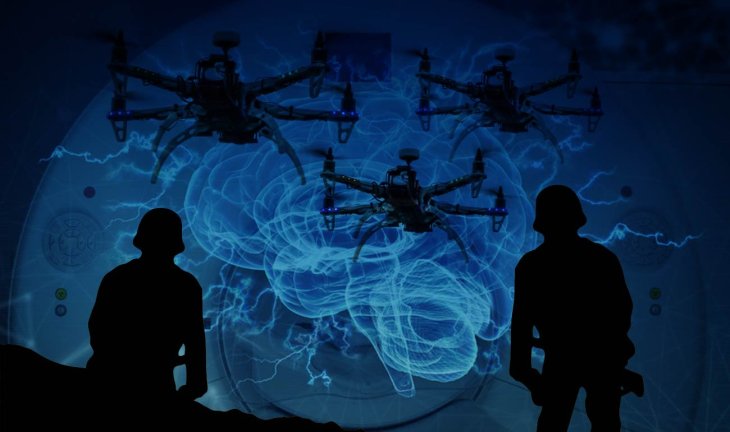Future Soldiers May Control Military Drones With Their Minds
Dhir Acharya - Dec 13, 2019

Six research teams are working under a program with the aim of creating a technology that allows soldiers to control drones using just their thoughts.
- Hundreds Of Drones Crashed Into Building During Performance
- This AI Defense System Forces Drones To Land Autonomously
- IIT Kharagpur Develops Drones To Bring 5G To Zero Network Area
The Pentagon is attempting to build a technology that will let soldiers used their minds to control deadly military drones.
Neuroscientist Al Emondi from DARPA said that these devices are meant to operate at the speed of thought instead of relying on mechanical devices. Emondi gave a heads-up about the Next-Generation Nonsurgical Neurotechnology program that DARPA launched in March last year with the hope to develop a BCI (brain-computer interface) that doesn’t require a surgical implant.

This May, DARPA awarded funding to six research teams in the US to pursue this goal, each of which holds a different approach from one another. For instance, one team is based at Carnegie Mellon University, who is performing tests to find out if ultrasound and electrical signals can support a non-surgical BCI. Meanwhile, another team is at Johns Hopkins University exploring the feasibility of near-infrared light.
However, creating a device that allows drones controlling through the minds of soldiers raises all types of troubling questions. What if a soldier thinks a command by accident? What if an enemy steals one device and gets control over the drones?

But all those questions aside, technologies initially developed for use in the military often end up making their way to civilian life and BCI’s influence on society can’t likely be overstated. For example, a regular user can strap the device on and control all of their devices that are connected to the Internet with their thoughts only.
It gets even more exciting regarding health applications. With a BCI device, people that have lost their limbs or those with paralysis can rely on just their minds to control prosthetics or even exoskeletons without having to undergo another surgery.
However, first thing first, we need a functional technology and as the DARPA research teams are making certain progress, there’s a lot to do before they can come up with a non-invasive BCI that is ready for military or even civilian use.
Featured Stories

Features - Jan 29, 2026
Permanently Deleting Your Instagram Account: A Complete Step-by-Step Tutorial

Features - Jul 01, 2025
What Are The Fastest Passenger Vehicles Ever Created?

Features - Jun 25, 2025
Japan Hydrogen Breakthrough: Scientists Crack the Clean Energy Code with...

ICT News - Jun 25, 2025
AI Intimidation Tactics: CEOs Turn Flawed Technology Into Employee Fear Machine

Review - Jun 25, 2025
Windows 11 Problems: Is Microsoft's "Best" OS Actually Getting Worse?

Features - Jun 22, 2025
Telegram Founder Pavel Durov Plans to Split $14 Billion Fortune Among 106 Children

ICT News - Jun 22, 2025
Neuralink Telepathy Chip Enables Quadriplegic Rob Greiner to Control Games with...

Features - Jun 21, 2025
This Over $100 Bottle Has Nothing But Fresh Air Inside

Features - Jun 18, 2025
Best Mobile VPN Apps for Gaming 2025: Complete Guide

Features - Jun 18, 2025
A Math Formula Tells Us How Long Everything Will Live
Read more

Mobile- Feb 16, 2026
Xiaomi Launches Affordable Tracker to Compete with Apple's AirTag
For users tired of ecosystem lock-in or high prices, the Xiaomi Tag represents a compelling, no-frills option that delivers core functionality at a fraction of the cost.

ICT News- Feb 15, 2026
X Platform Poised to Introduce In-App Crypto and Stock Trading Soon
X has been laying the groundwork for this expansion.

Mobile- Feb 17, 2026
Anticipating the Samsung Galaxy S26 and S26+: Key Rumors and Specs
The Samsung Galaxy S26 series is on the horizon, sparking excitement among tech enthusiasts.
Comments
Sort by Newest | Popular